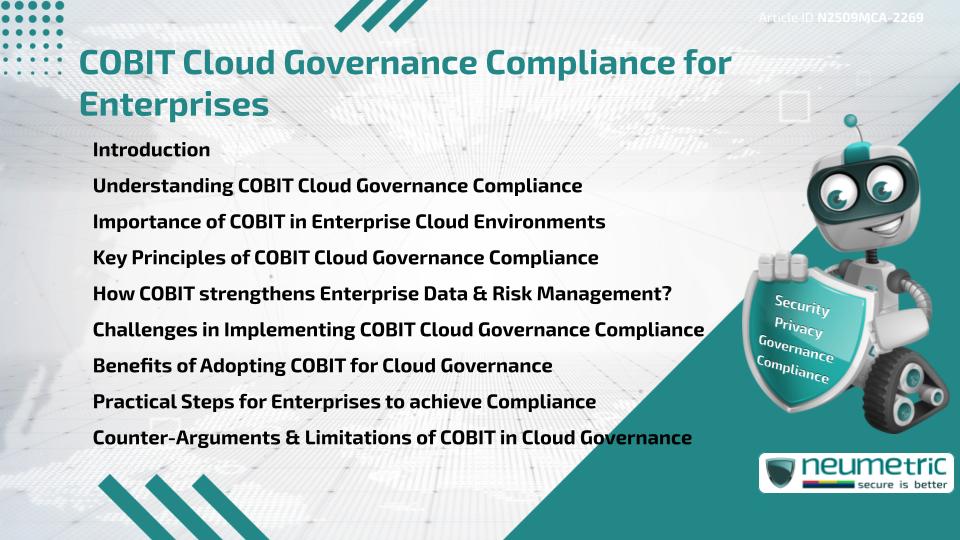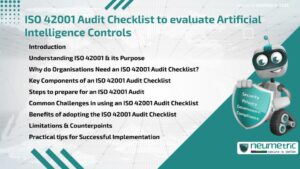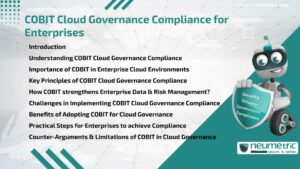Table of Contents
ToggleIntroduction
COBIT Cloud Governance Compliance has become a vital Framework for enterprises navigating complex Cloud environments. As organisations migrate workloads & data to the Cloud, they face new Governance challenges around Risk, Accountability & Compliance. COBIT [Control Objectives for Information & Related Technologies] offers a structured approach that aligns IT with business goals while meeting regulatory demands. By applying COBIT Cloud Governance Compliance, enterprises strengthen oversight, enhance decision-making & ensure their Cloud operations remain secure & compliant.
Understanding COBIT Cloud Governance Compliance
COBIT is an internationally recognised Framework developed by ISACA that provides Best Practices for governing & managing enterprise IT. When applied to Cloud Governance, COBIT Cloud Governance Compliance ensures that Cloud operations follow clear Policies, defined Responsibilities & Performance Monitoring standards.
It goes beyond technical controls by establishing a Governance structure that balances Risk Management, value Delivery & Regulatory alignment. For enterprises, this means ensuring Cloud strategies remain consistent with organisational objectives & Compliance obligations.
Importance of COBIT in Enterprise Cloud Environments
Enterprises increasingly depend on Cloud platforms for scalability & efficiency. However, the decentralised nature of the Cloud can lead to Governance Gaps. COBIT Cloud Governance Compliance addresses these by:
- Defining roles & responsibilities for Cloud usage.
- Establishing Risk frameworks for managing Data Security & Privacy.
- Aligning IT investments with business priorities.
- Integrating Regulatory Compliance into everyday operations.
This makes COBIT particularly valuable for enterprises managing multi-Cloud or hybrid environments.
Key Principles of COBIT Cloud Governance Compliance
The Framework is built on key principles that guide enterprises in governing their Cloud use:
- Meeting Stakeholder Needs: Ensuring Cloud services deliver measurable value.
- End-to-End Governance: Covering all aspects of Cloud, from Data Management to Vendor Accountability.
- Applying a Single Framework: Integrating COBIT across processes, systems & technologies.
- Enabling a Holistic Approach: Considering resources, people & culture, not just technology.
- Differentiating Governance from Management: Clarifying oversight responsibilities versus operational execution.
These principles ensure enterprises adopt a structured & consistent approach to Cloud Governance.
How COBIT strengthens Enterprise Data & Risk Management?
COBIT Cloud Governance Compliance strengthens enterprise Data & Risk Management by embedding Governance into daily Cloud operations. It enhances:
- Data Security: Ensuring Controls are applied consistently across Cloud platforms.
- Risk Mitigation: Providing frameworks to identify, assess & manage Risks.
- Regulatory Readiness: Helping organisations demonstrate Compliance with standards like GDPR, HIPAA & ISO.
- Audit Preparedness: Ensuring Policies & logs are documented for regulatory reviews.
In effect, COBIT transforms Governance from a reactive task into a proactive enterprise function.
Challenges in Implementing COBIT Cloud Governance Compliance
Adopting COBIT Cloud Governance Compliance is not without challenges:
- Complex Cloud Ecosystems: Enterprises may struggle to apply uniform Governance across diverse platforms.
- Resource Demands: Implementing COBIT requires skilled staff, time & investment.
- Cultural Resistance: Business units may resist Governance measures perceived as restrictive.
- Continuous Updates: Cloud services evolve rapidly, requiring ongoing adjustments to Governance models.
These challenges highlight the need for strong leadership commitment & phased implementation strategies.
Benefits of Adopting COBIT for Cloud Governance
Despite the hurdles, enterprises gain significant benefits from COBIT Cloud Governance Compliance:
- Improved Alignment: IT investments directly support business strategy.
- Enhanced Accountability: Clear roles reduce Governance ambiguity.
- Regulatory Confidence: Enterprises can demonstrate Compliance to Auditors & Regulators.
- Optimised Performance: Governance ensures Cloud investments deliver maximum value.
- Increased Trust: Stakeholders see enterprises managing Cloud responsibly.
These benefits reinforce why COBIT remains a leading Governance Standard.
Practical Steps for Enterprises to achieve Compliance
To achieve COBIT Cloud Governance Compliance, enterprises can follow practical steps:
- Assess Current Cloud Governance: Evaluate existing Policies & Gaps.
- Define Governance Objectives: Align COBIT practices with business strategy.
- Assign Accountability: Designate leaders for Cloud Governance roles.
- Implement Controls: Apply COBIT processes to Cloud operations.
- Monitor & Report: Continuously Review performance & Compliance metrics.
- Educate Teams: Provide training on Governance roles & responsibilities.
A phased, structured adoption approach helps enterprises achieve sustainable Compliance.
Counter-Arguments & Limitations of COBIT in Cloud Governance
Some critics argue that COBIT Cloud Governance Compliance may be too complex or resource-intensive for smaller enterprises. Others point out that while COBIT provides a strong Governance model, it does not prescribe detailed technical solutions for specific Cloud services. Instead, it must be supplemented with frameworks such as NIST or ISO for operational controls.
These limitations highlight that COBIT is best viewed as a Governance umbrella rather than a standalone security or Compliance solution.
Conclusion
COBIT Cloud Governance Compliance equips enterprises with a structured, principle-driven Framework for managing Cloud operations. By aligning IT with Business Goals, mitigating Risks & ensuring Regulatory adherence, COBIT strengthens Governance in increasingly complex Cloud environments.
Takeaways
- COBIT Cloud Governance Compliance ensures structured oversight of Cloud environments.
- COBIT balances Risk, Accountability & Regulatory obligations.
- Implementation challenges exist but can be managed with phased adoption.
- COBIT should complement technical frameworks to provide holistic Cloud Governance.
FAQ
What is COBIT Cloud Governance Compliance?
It is the application of COBIT principles to ensure Cloud operations align with Governance, Risk & Compliance standards.
Why is COBIT important for enterprises using Cloud services?
It helps align IT with Business Goals, manage Risks & ensure Regulatory Compliance.
What challenges come with COBIT Cloud Governance Compliance?
Challenges include complex Cloud ecosystems, resource demands, cultural resistance & evolving technologies.
How does COBIT differ from technical frameworks like NIST?
COBIT provides Governance principles, while NIST & ISO offer detailed technical & operational controls.
Can small enterprises benefit from COBIT Cloud Governance Compliance?
Yes, but they may need to scale practices based on resources & organisational maturity.
Does COBIT address Regulatory Compliance directly?
It supports Compliance by embedding Governance practices but requires integration with specific Regulatory Standards.
What steps should enterprises take to adopt COBIT in Cloud Governance?
Steps include assessing Governance maturity, defining objectives, assigning accountability, implementing controls & ongoing monitoring.
Need help for Security, Privacy, Governance & VAPT?
Neumetric provides organisations the necessary help to achieve their Cybersecurity, Compliance, Governance, Privacy, Certifications & Pentesting needs.
Organisations & Businesses, specifically those which provide SaaS & AI Solutions in the Fintech, BFSI & other regulated sectors, usually need a Cybersecurity Partner for meeting & maintaining the ongoing Security & Privacy needs & requirements of their Enterprise Clients & Privacy conscious Customers.
SOC 2, ISO 27001, ISO 42001, NIST, HIPAA, HECVAT, EU GDPR are some of the Frameworks that are served by Fusion – a SaaS, multimodular, multitenant, centralised, automated, Cybersecurity & Compliance Management system.
Neumetric also provides Expert Services for technical security which covers VAPT for Web Applications, APIs, iOS & Android Mobile Apps, Security Testing for AWS & other Cloud Environments & Cloud Infrastructure & other similar scopes.
Reach out to us by Email or filling out the Contact Form…





